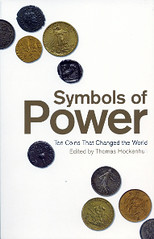
PREV ARTICLE
NEXT ARTICLE
FULL ISSUE
PREV FULL ISSUE
BOOK REVIEW: SYMBOLS OF POWER
An article in the August 20, 2015 Coins Weekly by Björn Schöpe reviews the new book by Thomas Hockenhull of the British Museum.
-Editor
One thing is certain: This book does not attempt to give a full account of the history of money or global economy. Instead, it takes the reader on a trip through time and across the world. The short general introduction is followed up by the thematic chapters, each of them dealing with one of the following ten coins: the shekel, the drachma, the denarius, the florin, the franc, the mark, the rupee, the yen, the pound, and the dollar. When browsing through the book, the reader quickly acknowledges that these coins indeed changed the world. There is hardly any territory or era that is not touched upon. On the other hand, some important currencies are missing, which leaves some white spots on the map of history: neither China nor Russia is referred to. As was said before, however, the authors make no claim of their book being complete. This book has been written in the best British and hence entertaining manner. It provides a marvelous introduction to the history of money as the interface between the object-oriented numismatics on the one hand and the theoretical economic history on the other hand. Fortunately, the authors do not rigidly restrict themselves to only one “coin” at a time. The chapter on the Roman denarius, for instance, likewise mentions this coin’s fractions as well as other denominations, and hence paints a more comprehensive picture of the history of Roman money. Unfortunately, however, choosing certain “coins” also leads to a lack of clarity. Take the shekel, for example. We learn that, long before coins have been introduced ca. 3000 BC, the shekel had been a unit of weight that was later used for fixing prices. The first silver coins were thus called shekel in the Near East – given their weight was one shekel. This ancient currency ceased to exist in the 2nd cent. AD but experienced a Renaissance in the 20th century. In 1980, Israel replaced the Israel pound with the new shekel. But which elements does this new modern currency share with the old one, except for the name? The same question arises when we look at Greece and the drachma. The chapters are not actually devoted to currencies but coins therefore. What is the basis for ancient and modern coins with the same name yet completely different characteristics being part of one and the same category? In the end, this is an idle question at this point. One might also criticize that the thaler did not receive a chapter of its own but is referred to in some short remarks on the background of the dollar only. With its high information density and its entertaining style the book proves that a topic can be addressed in a much clearer and more informative way if it is not subject to too rigid a definition. This approach is much more common in Great Britain than it is in Germany. A fact that can be lamented, though, is that the authors are not linked to the individual chapters. So we would like to thank them all for the beautiful book they have presented us with. To read the complete article, see:
Wayne Homren, Editor The Numismatic Bibliomania Society is a non-profit organization promoting numismatic literature. See our web site at coinbooks.org. To submit items for publication in The E-Sylum, write to the Editor at this address: whomren@gmail.com To subscribe go to: https://my.binhost.com/lists/listinfo/esylum All Rights Reserved. NBS Home Page Contact the NBS webmaster 
|
